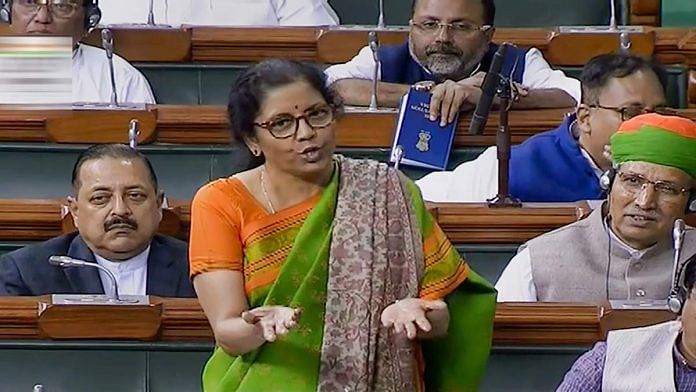New Delhi: The Narendra Modi government has provided major relief to students looking to pursue overseas education, as the finance ministry has decided to lower the rate of tax collected at source (TCS) for education-related remittances to 0.5 per cent, from the earlier proposed 5 per cent.
According to amendments to the Finance Bill moved by Finance Minister Nirmala Sitharaman, the lower TCS will be applicable for education-related remittances wherein the student has obtained the funds through an education loan from a financial institution.
The Finance Bill was passed by the Lok Sabha without debate, after the Parliament session ended ahead of schedule on account of the COVID-19 outbreak.
Also read: Modi govt is considering easier loans, tax rules to help economy fight coronavirus
The TCS fear
Sitharaman, in her budget speech presented on 1 February, had announced that a TCS will be levied on all remittances exceeding Rs 7 lakh a year, under the Reserve Bank of India’s liberalised remittance scheme (LRS).
Under the LRS, Indian residents can send up to $250,000 overseas every year, for purposes like studying abroad, medical treatment and emigration.
Tax experts, however, had pointed out that the government’s proposed 5 per cent TCS will increase costs for students pursuing overseas education while also increasing their paperwork. This was because the credit for the tax paid could be reclaimed only at the time of filing tax returns.
Though the government has sought to reduce the financial burden on the students, the compliance burden will continue.
An estimated 7.5 lakh Indian students are said to be studying abroad (2018 figure), and use loans and savings from India to finance their education.
“The relaxation on rate of TCS on remittance for overseas education is a welcome move. Many Indian students and their parents would benefit in terms of cash flow, especially considering the fact that the rupee is depreciating,” said Amit Maheshwari, chartered accountant and managing partner at Ashok Maheshwary and Associates LLP.
Also read: While fighting COVID-19, India must reduce bankruptcies, bring cash transfers & tax reliefs
Relief for NRIs
The government has also relaxed the residency rules and how non-residents will be taxed in India. The government has now proposed that the new provisions will only be applicable where the individual has over Rs 15 lakh in annual India-sourced income.
The amendment moved Monday has also specifically clarified that the total income calculation will exclude income from foreign sources, effectively ruling out salary income of non-residents.
The earlier budget proposal had created doubts whether NRIs will be subject to tax on their salary if the same is not taxed in the other country. This would have impacted NRIs living in the Gulf countries, where no income tax is levied, ThePrint had reported.
The government had, however, been quick to allay concerns, and assured that the Finance Bill will contain necessary amendments to clarify its stand.
Also read: Direct tax collection contracts in April-Feb period, Rs 3.5 lakh crore now needed in March




Only a government without morality or decency imposes taxes on students. Failing to create a decent education system for aspiring students, but shamelessly taxing those who are compelled to go abroad for a decent education.